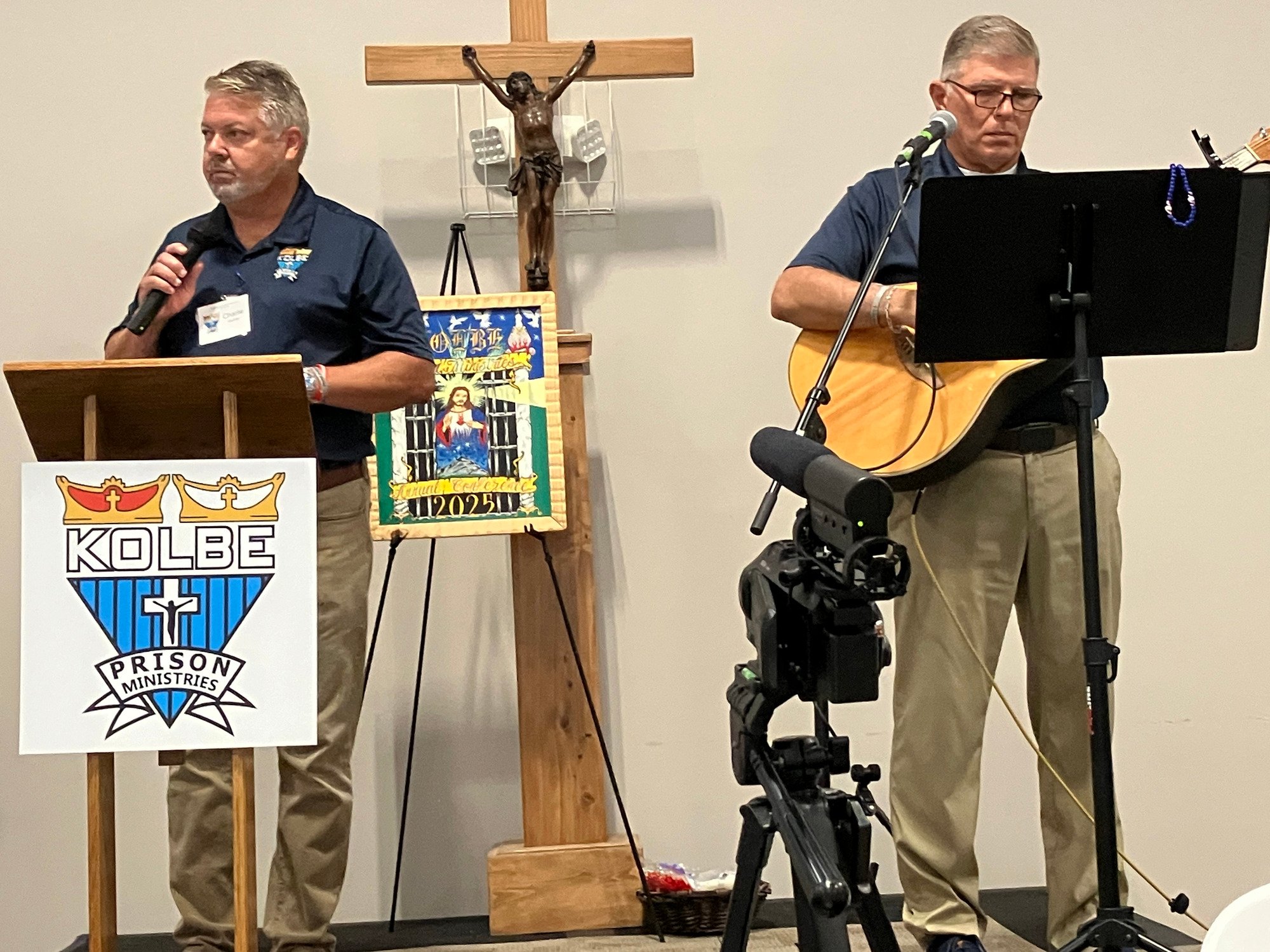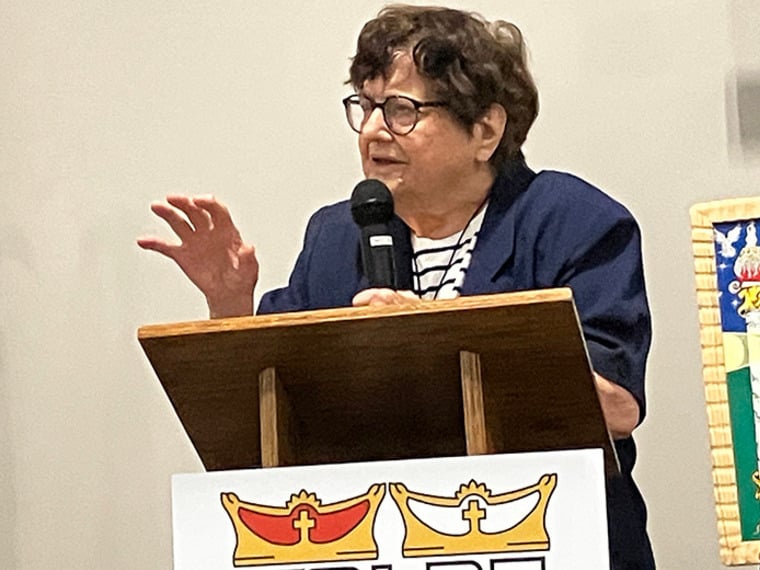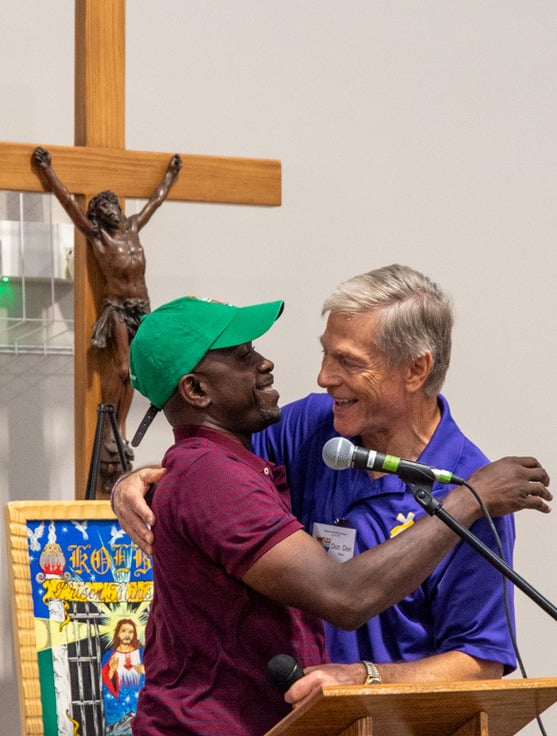Search
Forgotten No More: Kolbe Ministries Brings Love of Christ to Imprisoned
-
 August 18, 2025Sister Helen Prejean CSJ echoes St. Bonaventure’s words of wisdom by challenging others to, “Ask not for wisdom. Ask for the fire.” She advocates for the abolition of the death penalty and ministers to the “forgotten of society” in prisons.
August 18, 2025Sister Helen Prejean CSJ echoes St. Bonaventure’s words of wisdom by challenging others to, “Ask not for wisdom. Ask for the fire.” She advocates for the abolition of the death penalty and ministers to the “forgotten of society” in prisons.
Sister Helen and other speakers shared stories of broken lives, forgiveness, and redemption at the 10th annual Kolbe Prison Ministries Conference at Most Blessed Sacrament Church in Baton Rouge on July 26. Hundreds of people across the United States attended the conference, the first one held outside of Texas.
Kolbe Ministries facilitates prison retreats to help the incarcerated encounter Christ.
Sister Helen shared her story of acting as a spiritual advisor to death row prisoners and accompanying them to their executions. Her best-selling book, “Dead Man Walking,” chronicles her experiences with death row inmate Elmo Patrick Sonnier at Louisiana State Penitentiary at Angola. Sonnier and his brother, Eddie, were convicted in 1978 of the abduction and double murder of Loretta Bourque, 18, and David LeBlanc, 16

Top right photo: Hundreds of people gathered for the Kolbe Ministries conference. Photo by Jeb Broyles Above photos: Attendees began the day centered on prayer through the singing of the Divine Mercy Chaplet. Photos by Debbie Shelley | The Catholic Commentator
Sister Helen emphasized the need to minister to prisoners and victims’ families. She journaled in her book about walking alongside Lloyd LeBlanc, father of David LeBlanc, as he forgave Sonnier. She calls LeBlanc the “real hero” of the story.
“That fire of the love of Christ invites us and calls us and brings us into community,” she said.
Sister Helen’s remarks resonated with Michael Freeman of Houston, Texas. He directed the first Kolbe retreat at the Luther Unit in Navasota, Texas.
“The fire of the Holy Spirit becomes evident when we see the miracles of those who have turned back towards our Heavenly Father and find freedom behind the walls. It’s beautiful to see,” Freeman said. “The impact it had on me was that no matter what we have done Jesus came to bring peace. St. Francis of Assisi wished all peace. Our father has shown and taught us to forgive.”
Charlie Gauthier also sees the impact on Kolbe Ministries team members.
“Not one incarcerated person has asked me for anything materially. They only ask me one thing: please keep coming back … I thought they are always where they should be, but now that I’m in prison ministry, my thought process has changed and my Sister Helen Prejean CSJ shared her story of accompanying inmates on death row. Photo by Debbie Shelley | The Catholic Commentator respect, my humanity.
Sister Helen Prejean CSJ shared her story of accompanying inmates on death row. Photo by Debbie Shelley | The Catholic Commentator respect, my humanity.
“When you have Jesus in common, it is unbelievable how it can bring you together with someone who might be a totally opposite background of your thought process or other things. We all have come together and it's a brotherhood and a sisterhood. I love these people.”
Speaker Deacon Don Allison shared his riveting story of forgiving the person who shot him during a 1996 robbery attempt. A man approached him with a gun, and in “the perfect split second” the Holy Spirit and his guardian angel pushed him into a bush. The bullet clipped the back of his shirt. The shooter appeared to be leaving, but he returned and shot Allison in the right thigh and drove off. Through the Holy Spirit and a “push of adrenaline,” Deacon Allison ran to a neighboring hotel for help.
The doctor removed from Deacon Allison a .38 caliber hallow point bullet, also known as a “cop killer.” Upon impact, the bullet releases shrapnel “all over the place,” noted Allison.
The bullet miraculously passed through his thigh and lodged in his left calf without hitting any bones or nicking the femoral artery, which would have caused him to bleed to death in minutes.
Police arrested Marcus Cheffen, who confessed to shooting Deacon Allison.
The deacon was told that, even with good time, Cheffen would not be released for 47 ½ years. In 2016, however, Deacon Allison was notified that Cheffen was scheduled for a parole hearing. Cheffen said he converted in prison, was remorseful for what he did to Deacon Allison, and was not a threat to society.
Deacon Allison’s testimony weighed heavily in the parole board’s decision to deny Cheffen’s parole request. Deacon Allison later wondered if he did the right thing. He entered the Victim-Offender Dialogue Program. The victim-initiated process leads to a face-to-face meeting; Deacon Allison and Cheffen were approved for the meeting.
When it came time to confirm Deacon Don Allison, right, and Marcus Cheffen, who shot him during a 1996 robbery attempt, embraced after Deacon Allison shared his story of his journey toward forgiving Cheffen. Photo by Jeb Broylesthat he wanted to meet Cheffen, Deacon Allison attended the transitional diaconate ordination of Father Timothy Grimes. While there, God called him to the permanent diaconate. Through his diaconate formation he learned about the Church’s teaching on forgiveness.
Deacon Don Allison, right, and Marcus Cheffen, who shot him during a 1996 robbery attempt, embraced after Deacon Allison shared his story of his journey toward forgiving Cheffen. Photo by Jeb Broylesthat he wanted to meet Cheffen, Deacon Allison attended the transitional diaconate ordination of Father Timothy Grimes. While there, God called him to the permanent diaconate. Through his diaconate formation he learned about the Church’s teaching on forgiveness.
Deacon Allison met with Cheffen and helped him arrange for a second parole hearing and that time testified on his behalf.
Cheffen spoke to attendees about how the second chance affected him.
“God has a plan for me. His plan for me was for me and Mr. Allison to be best friends,” said Cheffen. “Mr. Allison is my best friend because he has the biggest heart in the world.”Cheffen spoke about the power of forgiveness and embraced Deacon Allison.
Speaker Krystle Simon, assistant warden at Allen Correctional Center in Kinder, thanked the Kolbe ministers for the changes the retreats produce in prisoners.
“I thought it would be a little group come in and have a little church service and that was all I was going to have to deal with. Boy was I wrong,” Simon said with a big smile.
Simon stated the love the ministry provides for the incarcerated is “phenomenal.”
“They call them the ‘hugging ministry’ because they come hugging the inmates and tell them how much they love them.”
Andrew Hundley, co-founder of the Louisiana Parole Project, stressed the importance of accompanying the formerly incarcerated. Hundley was the first juvenile lifer in Louisiana to be paroled following the U.S. Supreme Court’s Miller/Montgomery rulings that prohibited the mandatory sentencing of juveniles to life without parole. An adoration chapel was set up so people could spend time before the Blessed Sacrament. Photo by Debbie Shelley | The Catholic CommentatorI
An adoration chapel was set up so people could spend time before the Blessed Sacrament. Photo by Debbie Shelley | The Catholic CommentatorI
Hundley said prison changes people.
“Some released from prison came out better people and some people came out of prison better criminals,” Hundley.
After leaving prison, people must learn life skills such as using a credit card when pumping gas, using computers and cell phones, and obtaining employment.
The Louisiana Parole Project, Hundley said, works with formerly incarcerated people and their families to help them succeed in society and not return to prison.
John Paul Funes, business and industry liaison for the Louisiana Parole Project, also talked about the importance of forgiveness and supporting the formerly incarcerated.
Following the conference, attendees attended Mass at MBS celebrated by Bishop Michael G. Duca.
To learn more about Kolbe Ministries, visit kolbeprisonministries.org.
